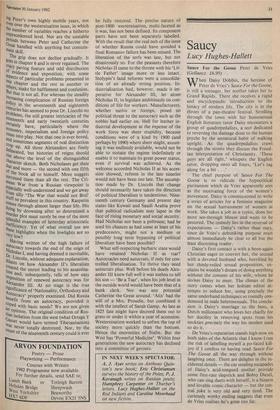Saucy Lucy Hughes-Hallett
Sauce For the Goose Peter de Vries (Gollancz £6.95) When Daisy Dobbin, the heroine of Peter de Vries's Sauce For the Goose, is still a teenager, her mother takes her to
Grand Rapids. There she receives a rapid and encyclopaedic introduction to the lunacy of modern life. The city is in the throes of a pan-theatre festival. Strolling through the town with her homosexual English literature tutor Daisy encounters a group of quadrepedalists, a sect dedicated to reversing the damage done to the human psyche by the unnatural habit of walking upright. As the quadrepedalists crawl through the streets they discuss the Freud- ian interpretation of Christianity. 'These guys are all right,' whispers the English tutor, dropping onto all fours, 'Let's tag along for a bit . .
The chief purpose of Sauce For The Goose is to ridicule the hypocritical puritanism which de Vries apparently sees as the motivating force of the women's movement. Daisy is commissioned to write a series of articles for a feminist magazine on the sexual harrassment of women at work. She takes a job as a typist, dons her most see-through blouse and waits to be pestered. The comedy lies in the reversal of expectations — Daisy's rather than ours, since de Vries's debunking purpose must almost immediately be clear to all but the least discerning reader.
Daisy's first contact is with a born-again Christian eager to convert her, the second with a devoted husband who, horrified by her thinly-veiled sexual proposition, ex- plains he wouldn't dream of doing anything without the consent of his wife, whom he invites Daisy to meet. The climax of the story comes when her lesbian editor at- tempts to seduce her, using precisely the same underhand techniques so roundly con- demned in male heterosexuals. The conclu- sion is Daisy's marriage to the boss, a Dutch millionaire who loves her chiefly for her docility in removing spots from his neckties precisely the way his mother used to do it.
De Vries's reputation stands high now on both sides of the Atlantic that I know I run the risk of labelling myself a po-faced kill- joy if I confess to having read Sauce For The Goose all the way through without laughing once. There are delights in the in- cidental details — the car stealing escapades of Daisy's acid-tongued mother provide some first-rate slapstick and Bobsy Diesel, who can sing duets with herself, is a bizarre and lovable comic character — but the cen- tral joke is very old and very tired. The curiously wonky ending suggests that even de Vries realises he's gone too far.


































 Previous page
Previous page